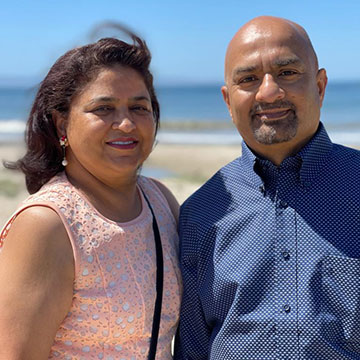Oral Exams and Cleanings
Preventing Problems Before They Start
The health of your teeth and mouth is very important to the well-being of your entire body, and while routine brushing and flossing at home is necessary to keep your smile looking its best, visiting Dr. Chitgopekar for a comprehensive exam and cleaning is essential. The American Dental Association recommends that you visit your dentist every six months to ensure your teeth stay healthy and your smile stays beautiful.
By routinely seeing Dr. Chitgopekar for exams and cleanings, you can:
- Prevent tooth decay, gum disease, and bad breath
- Save money by avoiding costly and extensive dental procedures
- Keep your teeth white by reducing staining from food and drinks
- Have a smile that will last a lifetime
The Exam
During your exam, Dr. Chitgopekar will thoroughly examine your teeth and gums for signs of tooth decay, gum disease, and other health problems. She may also want to take X-rays to see what is happening beneath the surface of your teeth and gums. At Dr. Chitgopekar's, these X-rays are digital and the images help her discover dental issues not visible to the naked eye.
In addition to your dental exam, Dr. Chitgopekar will also review your medical history and invite you to share your concerns about your health and quality of life. She will then spend the time helping you understand the risks posed by compromised oral health on the progression of chronic diseases like BP and diabetes, and debilitating ailments like acid-reflux, snoring, morning headaches, excessive daytime fatigue and brain fog, to name a few.
Professional Cleanings
Dr. Chitgopekar's dental hygienist will begin your cleaning by exploring the surface of your teeth to determine if you have any cavities and to examine the quality of existing fillings. She will then perform a periodontal exam to make sure your gums adhere tightly to your teeth, and no periodontal disease or bone loss may occur.
Next, the hygienist will carefully clean your teeth with a variety of tools to remove any hard mineral buildup (tartar) from your teeth. Then she will floss your teeth, use a polishing compound, and apply fluoride. Cleanings usually aren't painful, but if you have any anxiety about your dental exam, be sure to let the hygienist know. She may offer several sedation options to ensure your comfort. If the hygienist finds tooth decay or gum disease, she will talk to you about changing your brushing or flossing habits. In severe cases, she may recommend antibiotics or other dental treatments. If your teeth and gums appear to be healthy, the hygienist will probably recommend that you continue your brushing and flossing routine as usual.
At the end of your hygiene visit, Dr. Chitgopekar will do a comprehensive examination, review the hygienist's findings, and recommend treatment if necessary.









